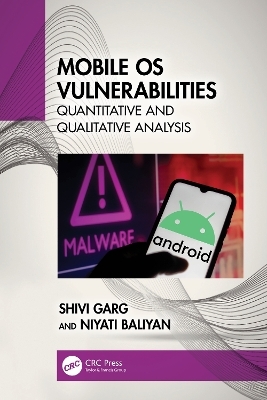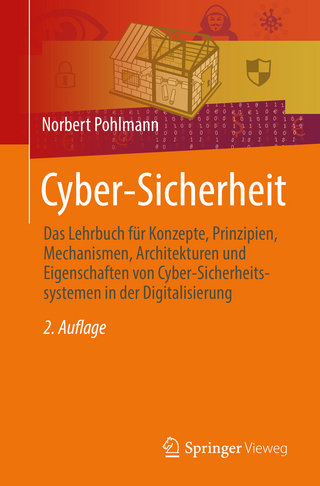
Mobile OS Vulnerabilities
CRC Press (Verlag)
978-1-032-40748-7 (ISBN)
- Lieferbar (Termin unbekannt)
- Versandkostenfrei innerhalb Deutschlands
- Auch auf Rechnung
- Verfügbarkeit in der Filiale vor Ort prüfen
- Artikel merken
This is book offers in-depth analysis of security vulnerabilities in different mobile operating systems. It provides methodology and solutions for handling Android malware and vulnerabilities and transfers the latest knowledge in machine learning and deep learning models towards this end. Further, it presents a comprehensive analysis of software vulnerabilities based on different technical parameters such as causes, severity, techniques, and software systems’ type. Moreover, the book also presents the current state of the art in the domain of software threats and vulnerabilities. This would help analyze various threats that a system could face, and subsequently, it could guide the securityengineer to take proactive and cost-effective countermeasures.
Security threats are escalating exponentially, thus posing a serious challenge to mobile platforms. Android and iOS are prominent due to their enhanced capabilities and popularity among users. Therefore, it is important to compare these two mobile platforms based on security aspects. Android proved to be more vulnerable compared to iOS. The malicious apps can cause severe repercussions such as privacy leaks, app crashes, financial losses (caused by malware triggered premium rate SMSs), arbitrary code installation, etc. Hence, Android security is a major concern amongst researchers as seen in the last few years. This book provides an exhaustive review of all the existing approaches in a structured format.
The book also focuses on the detection of malicious applications that compromise users' security and privacy, the detection performance of the different program analysis approach, and the influence of different input generators during static and dynamic analysis on detection performance. This book presents a novel method using an ensemble classifier scheme for detecting malicious applications, which is less susceptible to the evolution of the Android ecosystem and malware compared to previous methods. The book also introduces an ensemble multi-class classifier scheme to classify malware into known families. Furthermore, we propose a novel framework of mapping malware to vulnerabilities exploited using Android malware’s behavior reports leveraging pre-trained language models and deep learning techniques. The mapped vulnerabilities can then be assessed on confidentiality, integrity, and availability on different Android components and sub-systems, and different layers.
Shivi Garg has Doctor of Philosophy in December 2021 from Information Technology Department, Indira Gandhi Delhi Technical University for Women, (IGDTUW), Delhi, India. Thesis title: Design and Analysis of Mobile Application Vulnerabilities. She is also a post graduate in Information security from Delhi Technological University (DTU) Delhi, India. She has teaching and research experience since August 2016. Currently she is an Assistant Professor at J.C. Bose University of Science & Technology, YMCA, Faridabad. Her research interests include- Information Security, mobile security, cyber security, and Machine learning. Her publication and other details can be found at: https://sites.google.com/view/shivigarg/home Niyati Baliyan is an Assistant Professor, Department of Computer Engineering, National Institute of Technology Kurukshetra, Haryana. She has attained Doctor of Philosophy from Computer Science Department, Indian Institute of Technology (IIT) Roorkee, India. Her thesis title was "Quality Assessment of Semantic Web based Applications". She also has a Post Graduate Certificate in Information Technology from Sheffield Hallam University, Sheffield, U.K.Niyati obtained Chancellor’s Gold Medal for being University topper during post graduate studies at Gautam Buddha University. She is co-author of "Semantic Web Based Systems: Quality Assessment Models, SpringerBriefs in Computer Science",2018. Her research interests include-Knowledge Engineering, Machine Learning, Healthcare analytics, Recommender systems, Information Security, and Natural Language Processing. Her publication and other details can be found at: https://sites.google.com/site/niyatibaliyan.
1. Introduction. 2. Background. 3. Relevant Works and Studies Related to Android and iOS. 4. A Parallel Classifier Scheme for Vulnerability Detection in Android. 5. Classification of Android Malware Using Ensemble Classifiers. 6. Text Processing-Based Malware-to-Vulnerability Mapping for Android. 7. Android Vulnerabilities Impact Analysis on Availability, Integrity, and Confidentiality Triad at the Architectural Level. 8. Conclusion and Future Directions.
| Erscheinungsdatum | 13.11.2024 |
|---|---|
| Zusatzinfo | 27 Tables, black and white; 73 Line drawings, black and white; 5 Halftones, black and white; 78 Illustrations, black and white |
| Verlagsort | London |
| Sprache | englisch |
| Maße | 156 x 234 mm |
| Themenwelt | Informatik ► Netzwerke ► Sicherheit / Firewall |
| Informatik ► Software Entwicklung ► Mobile- / App-Entwicklung | |
| Recht / Steuern ► Privatrecht / Bürgerliches Recht ► IT-Recht | |
| ISBN-10 | 1-032-40748-4 / 1032407484 |
| ISBN-13 | 978-1-032-40748-7 / 9781032407487 |
| Zustand | Neuware |
| Informationen gemäß Produktsicherheitsverordnung (GPSR) | |
| Haben Sie eine Frage zum Produkt? |
aus dem Bereich


